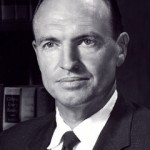C. Clyde Atkins
(1914-1999)

The Honorable C. Clyde Atkins was known as a champion of civil rights and a defender for those who were less fortunate as well as a passionate supporter of the legal justice system. His achievements in this arena included advocating for the rights of the homeless, upholding the rights of Cuban and Haitian refugees to lodge petitions in U.S. courts, and working for the desegregation of public schools.
Atkins’s academic career began at the University of Florida, where he earned a degree in law in 1936.
While in law school, Atkins was an active member of the varsity debate team, where he was on the Executive Council. Atkins also was an active member in the John Marshall Society and Phi Kappa Tau national fraternity, and served as vice-justice for the national legal fraternity, Phi Alpha Delta. His hard work and commanding leadership did not go unnoticed, and earned him entry into Florida Blue Key in 1935.
After graduating from UF Law, Atkins headed back to south Florida to begin his legal career in Stuart. In 1941, he joined law school classmate Bill Lantaff (JD 36) at Casey & Walton in Miami, where he worked for the next 25 years and became a name partner. Practicing as an active trial lawyer in the areas of corporate, real estate, railroad and insurance gave him the foundation for his unprecedented 33-year career as a federal judge.
Atkins was appointed by President Lyndon B. Johnson as the judge of the U.S. District Court, Southern District of Florida and served as the chief judge of the district from 1977 to 1982. President Jimmy Carter recognized his willingness to serve others by appointing him to the National Commission for the Review of Antitrust Laws and Procedures from 1978 to 1979.
Atkins presided over thousands of cases and was known by many for his astute judgment, fairness, impartiality and commitment to the law.
“If he’s convinced it’s guaranteed by the Constitution, he is fearless,” Chesterfield Smith (JD 48) once said of Atkins’s commitment to law. “He doesn’t care if it’s unpopular. He’ll stand alone.”
Some of his most publicized cases included presiding over the desegregation of Dade County schools beginning in 1969 and continuing jurisdiction for over 25 years; a ruling allowing Allen Ginsberg, a poet who was denied his freedom of expression when the chief of police turned off his microphone, to be given another reading free of charge; the action brought by the Justice Department seeking to prevent Florida Power & Light from building the Turkey Point nuclear power plant in Dade County; and a wildcat machinist strike at National Airlines where he refused to reinstate striking machinists after they disobeyed his injunction to return to work to allow the airline to resume operations. Atkins also presided over serious drug cases that earned his district court a national reputation as one of the finest in the 1970s.
In the 1990s, Atkins ruled against both the H.W. Bush and Clinton administrations’ policies to repatriate Cuban and Haitian refugees housed in Guantanamo Bay, Cuba. He issued several injunctions against the policies, stating the government must allow the refugees proper legal counsel and follow correct procedures. The government won the appeals in the 11th Circuit and the U.S. Supreme Court, with Judge Joseph Hatchett and Justice Thurgood Marshall dissenting in Atkins favor.
In 1992, he ruled on arguably his most influential case involving the homeless in Miami. He ordered the creation of “safe zones” for the area’s homeless to congregate without the threat of police arrest. Much of the nation’s subsequent attitude to rehabilitate the homeless through training and the creation of shelters was influenced by this decision.
Atkins assumed senior status as the district’s senior judge on December 31, 1982. In his senior status, Atkins maintained a 70 percent caseload by accepting 50 percent random assignment of cases at the district level. Ten days before his death, Atkins was still signing court orders.
Over his illustrious career, Atkins has received numerous public service awards including being named as a Knight of St. Gregory by Pope Paul VI, having the University of Miami’s Moot Court named in his behalf, and being honored with the National Conference for Community and Justice Distinguished Community Service Award.
Atkins passed away on March 11, 1999, and is survived by his wife Esther; daughter Julie Atkins Landrigan; and grandchildren Thomas Schulte Jr., Carl Schulte, Carl Atkins, Juliette Atkins Wood, Julie-Anne Schulte Wohlberg, Gregory Landrigan, and Ashley Atkins. Two children, Carla Atkins Schulte and Carl Clyde Atkins, and one granddaughter, Mary Margaret Schulte, predeceased him.
